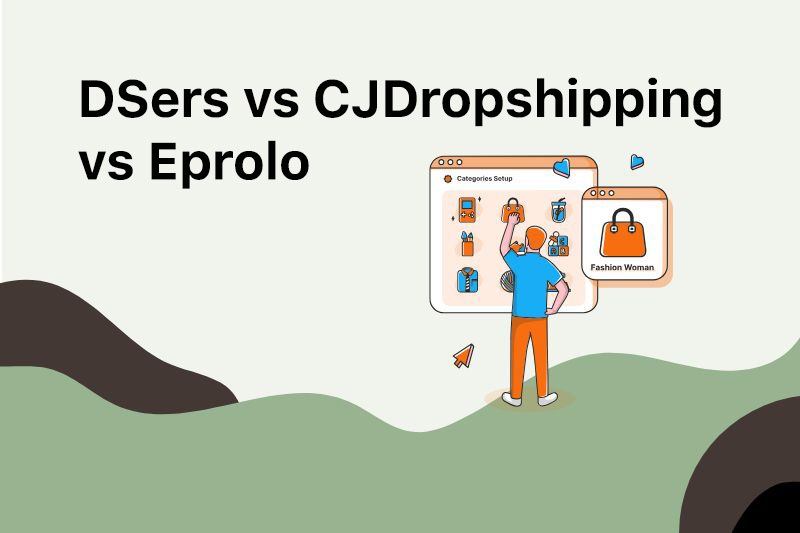Profitable Niches With Low Competition and High Demand in 2026

Most people jump into online business thinking they need to sell whatever is already trending.
But there's a problem with that: trends attract crowds, and before you know it, you're in a race to the bottom, fighting over the same customers with razor-thin margins. The real opportunity is in profitable niches with low competition - those spaces where demand is high, but the competition hasn’t flooded in yet.
But finding these niches is more than luck. It’s about finding gaps in the market, using product research tools like Google Trends, and understanding what makes a niche profitable and sustainable at the same time.
Some businesses skyrocket and last for years - others fizzle out the moment the trend dies. The difference is in picking the right space to compete in.
In this guide, we’ll go over how to find profitable niches and which ones are truly “low competition.” Let’s get into it!
What Makes a Niche "Low Competition"

Not every small niche is a hidden goldmine. Some are empty for a reason - they simply don’t make money. Most profitable niches have plenty of demand but fly under the radar of big brands because they seem “too specific” (which, ironically, is what makes them work). The goal is finding that sweet spot - a niche that’s small enough to avoid oversaturation but big enough to actually be profitable.
A promising niche has:
- Consistent demand – Not just a seasonal trend. People are searching for it year-round.
- Few major competitors – If Amazon, Walmart, and other giants dominate the search results in a particular niche, breaking in won’t be easy.
- High-margin potential – Selling products with tiny profit margins in a competitive niche won’t get you far. You need room for real profits and growth.
- Room for differentiation – If you can niche down even further within it (like "eco-friendly pet toys" instead of just "pet products"), you’ve found something promising.
The best niches fly under the radar of industry giants but still have an audience ready to buy.
If you’re not sure where to start or want a store built around proven low-competition niches, let Dropbuild handle it for you - market research, setup, and all!
Now that you know what makes a niche worth pursuing, let’s get to the fun part: those hidden, profitable niche ideas that most sellers overlook.
1. Personalized Home Office Gear: The Future of Work

Remote work is here to stay. But people aren’t just looking for a chair that doesn’t kill their back or a desk that holds their laptop. They want personalized setups that fit their work style, boost productivity, and look good on Zoom calls.
Most office furniture is mass-produced and uninspired. There’s no shortage of generic chairs, basic desks, and plastic storage bins. But engraved wrist rests, premium laptop stands, noise-reducing wall panels - these are the kinds of products that bring function and personality together.
Why does this niche work?
- People spend on comfort and productivity - When your desk is where you spend eight hours a day, investing in better gear feels like a necessity, not a luxury.
- Personalization adds a premium factor - Customized desk accessories and workspace upgrades can command higher profit margins than generic alternatives.
- Office gear is an evergreen niche - Unlike one-hit-wonder products, workspace essentials stay relevant year-round. People will always look for ways to work smarter and more comfortably.
And this market goes beyond just function - aesthetic-driven setups are on the rise. Remote workers want their workspace to feel like theirs, whether that means minimalist standing mats, sleek LED lighting, or modular desk organizers that keep everything within reach.
When buying such furniture, people are actually building an environment that boosts their productivity. That’s why this niche is a clever long-term opportunity in e-commerce.
2. DIY Craft Kits for Adults: Turning Hobbies Into a Business

The DIY market proves that crafting isn’t just for kids. While stores are packed with loose supplies, curated DIY kits designed for adults sit in a category of their own - low competition, high demand, and a good profit potential.
Think resin art, candle-making, embroidery, woodworking, or clay sculpting - hobbies that work better with an all-in-one kit than a pile of random materials.
Why does this niche work?
- The demand is rising – People want hands-on hobbies that pull them away from screens and help them relax.
- Kits offer convenience – Finding all the right supplies separately is a hassle. A ready-made kit with everything included lets you get to the fun part right from the start.
- Premium kits justify higher prices – A $5 bag of candle wax isn’t exciting. A $50 candle-making kit with custom scents and a step-by-step guide is a product people pay for.
Most craft stores sell supplies, but DIY kits sell an experience. They take away the guesswork and make creative projects easier and more fun—which is exactly why buyers love them.
And there’s plenty of room to niche down:
- Eco-friendly craft kits using sustainable materials.
- Luxury craft kits with premium supplies for serious hobbyists.
- Themed kits (seasonal decor, wedding favors, or home office decorations).
Whether it’s a candle-making kit with unique scents or an embroidery set designed for beginners, this niche taps into creativity, relaxation, and personalization—three things that never go out of demand.
Not sure how to turn a niche like this into a store? Dropbuild’s done-for-you service takes care of everything - from product sourcing to storefront setup. Get started today and hit the ground running!
3. Portable Health Devices: Health Tech Without the Oversaturation

Health-conscious shoppers aren’t waiting for doctor visits to manage their well-being anymore—they want at-home solutions that fit into their daily lives. And while fitness trackers have been done to death, the demand for portable health devices is still growing.
The market is moving toward niche wellness tools that solve everyday problems. Wireless TENS units for pain relief, portable nebulizers for asthma sufferers, and smart posture correctors that buzz when you start slouching have all become practical health solutions people actually need.
Why does this niche work?
- Health is a priority purchase - If it improves quality of life, people are willing to pay for it.
- Aging populations are a growing market - Mobility aids, pain relief, and breathing support devices are needed more than ever.
- Convenience sells - Nobody wants to book an appointment for something they can easily manage at home.
Unlike traditional medical devices, these products are tech-driven, user-friendly, and easy to market online. We’re already seeing demand spike for things like wearable sleep trackers, smart hydration monitors, and UV sanitizers for toothbrushes. But this space is still far from oversaturated.
Want to stand out? Focus on products that blend health, convenience, and innovation. A migraine-relief headband, an air-quality tracker, or a smart knee massager - all high-demand, low-competition products that people are actively searching for.
4. Specialty Car Accessories: Catering to Car Enthusiasts

The mass market is flooded with cookie-cutter products for car owners, but there’s a huge demand for model-specific gear that enhances both function and style.
Most car accessories are broad and basic, but enthusiasts and daily drivers alike are willing to pay more for custom solutions. Tesla owners want sleek console organizers that match their minimalist interiors. Jeep drivers need modular storage for off-road adventures. Truck owners, on the other hand, look for rugged tailgate add-ons built for heavy-duty use.
Why does this niche work?
- Car owners are fiercely brand-loyal - They don’t want generic accessories; they want gear built specifically for their make and model.
- Customization adds value – Premium materials, custom-fit designs, and aesthetic upgrades make it easy to charge higher prices.
- Tech integration is booming – Wireless charging organizers, smart dashboard upgrades, and LED ambient lighting kits are gaining popularity.
Skip the generic accessories - car owners want gear that feels like it was made for their vehicle. Products that sell well are things like leather-wrapped steering wheels, weatherproof trunk organizers, or custom-fit LED ambient lighting that give any car a sleek, modern look.
Succeeding in this niche comes down to precision. The more personalized the solution, the more buyers are willing to pay. Whether it’s better storage, smarter tech, or an aesthetic upgrade, car enthusiasts will always invest in making their ride stand out.
5. Eco-Friendly Pet Products: Sustainability Meets a Booming Market

The pet industry is a multi-billion-dollar market, yet sustainable pet products are still flying under the radar. While eco-friendly options are everywhere for human food, cleaning, and self-care, pet owners still struggle to find green alternatives that don’t compromise quality or safety.
And the demand is already there. More pet owners want biodegradable, organic, and nontoxic products, but big brands haven’t fully embraced sustainability in the pet space. That leaves a huge opportunity for small businesses to step in with eco-friendly pet essentials - like compostable litter, natural grooming products, and ethically sourced pet beds.
Why does this niche work?
- Pet owners are repeat buyers - Food, toys, and grooming supplies need constant replenishing, creating steady sales.
- Sustainability is no longer a niche trend - Consumers are rethinking their purchases, and that includes what they buy for their pets.
- Low market saturation - Unlike human wellness, sustainable pet products still have plenty of room to grow.
Some winning product ideas could be bamboo dog bowls, hemp rope toys, plant-based treats, and organic pet shampoos—all catering to the increasing demand for safe, natural alternatives.
This niche is about aligning with a movement. Pet owners are already willing to pay more for premium, natural products. Brands that position themselves as both sustainable and pet-safe will build long-term loyalty in a profitable niche market that’s only getting bigger.
6. High-End Subscription Boxes: A Recurring Revenue Goldmine

Most subscription boxes fail because they’re too broad - cheap snacks, generic beauty products, or a random assortment of stuff nobody really needs. People subscribe for a few months, get bored, and cancel. The real wins come from premium, niche subscription boxes that deliver actual value to a dedicated audience.
Why does this niche work?
- Customers stick around - A well-curated subscription creates repeat buyers who stay subscribed.
- Exclusivity adds value - Rare, high-quality products keep people excited.
- Convenience - People will pay for expert curation that saves time.
Winning ideas could be luxury tea and coffee boxes with rare, single-origin blends, pet wellness boxes with organic supplements and breed-specific care, and hobbyist boxes featuring curated chess pieces, rare vinyl records, or specialty plant kits.
Curation is what matters here. A great subscription box offers something unique and keeps customers engaged with every delivery.
Wrapping It Up: Which One Caught Your Eye?

The best low-competition niches are there, waiting for you to see their potential. Doing things right isn’t about chasing trends; it’s about getting ahead of demand before the market gets crowded.
Whatever niche you choose, the real value is in going deeper - understanding your audience, solving specific problems, and offering something people can’t easily find elsewhere.
The dropshipping stores that will thrive in 2026 won’t be the ones selling anything and everything. They’ll be the ones that find low-competition niches and stand out from the rest.
So, which lucrative niche will you grab before the competition catches on? If you’d rather not stress over it, sign up for Dropbuild’s done-for-you service and let the experts build your store from the ground up—niches included!
dropshipping business?





